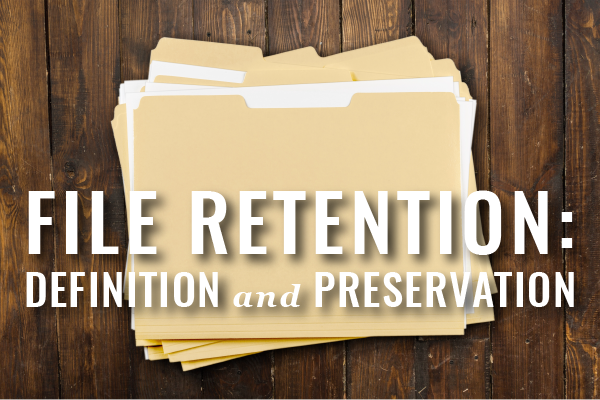Effective September 1, 2018, new Rule 1.15A sheds light on what exactly the Client’s File actually is and how long lawyers need to preserve them. Find the answers to your questions here.
On June 7, 2018, the SJC adopted an order that amends the Rules of the Supreme Judicial Court, and in particular, Massachusetts Rules of Professional Conduct, adding Rule 1.15A regarding client files.
This new rule is effective September 1, 2018. You can view the new rule, here and read what Bar Counsel has to say about the new rule, here.
Our practice advisors receive tons of questions regarding retention and disposition of client files. The new rule provides answers to many of those questions and sets forth guidance for law firms.
What exactly does the client’s file consist of?
Rule 1.15(a) details all materials that are considered part of the client’s file, including those in both physical and electronic format, copies of your work product, and more. Lawyer’s “work product” is defined for purposes of the rule to include “documents and tangible things prepared in the course of the representation of the client by the lawyer or at the lawyer’s direction by the lawyer’s employee, agent, or consultant”, but as per comment 3, do not “ordinarily” include a lawyer’s personal notes. The client’s file does not include firm administrative data such as billing records, conflict checks, and administrative communications with the client. Rule 1.15A, Cmt 5.
How long must I preserve the client’s file?
Six years after completion or termination of representation in the matter. This time frame is now written into the rules. There are some limited exceptions that will require long periods of retention, as are laid out in Rule 1.15A(d) (intrinsically valuable documents), (e) (claim pending or anticipated), and (f) (criminal and delinquency matters). “Intrinsically valuable documents” include “trust property” under Rule 1.15 or those that “have legal, operative, personal, historical or other significance in themselves, including wills, trusts and other executed estate planning documents, deeds, securities, negotiable instruments, and official corporate or other records.” Rule 1.15A(a).
Can the client agree to a shorter period of retention?
According to Rule 1.15A(c), the client can “agree in writing to an alternative arrangement”, except in cases of representation of a minor.
Can I preserve the file solely in electronic format?
Yes! However, if the original form of the document is important or applicable law requires physical preservation for legal effectiveness, then it should be retained in that format. Rule 1.15A, Cmt 4.
Can I destroy the file after the designated retention period?
Yes! “If the client has not requested the file within six years after completion or termination of representation or within six years after a minor reaches the age of majority, the file may be destroyed.” Rule 1.15A(c). Again, limited exceptions are found in sections (d), (e), and (f). You must maintain confidentiality when destroying the client’s file.
If a client requests their file but hasn’t paid, can I withhold the file?
In certain circumstances, under Rule 1.15A(b):
-
If the client agreed in the fee agreement to pay for investigatory or discovery documents and has not, you are not required to turn over those documents.
-
Under a contingency fee agreement, you need only turn over work product for which the client has paid.
Should I address retention and disposition in my engagement letter or fee agreement?
Yes, the Rule specifically encourages you to do so. Furthermore, best practice is to also address retention in your final communication (i.e. closing letter or disengagement letter), specifically, “where particular arrangements for disposition or transfer have not been made”. Rule 1.15A, Cmt 1.
Can I charge a fee for copying and delivering the file to the client?
Yes. You may charge for copying “pleadings and other papers” filed with the court or served on another party and copies of your work product. However, you cannot mark up the cost; it must be commensurate with your actual copying costs.You can also charge for delivery of the file; but, again, you cannot mark up the cost. Rule 1.15A(b).




